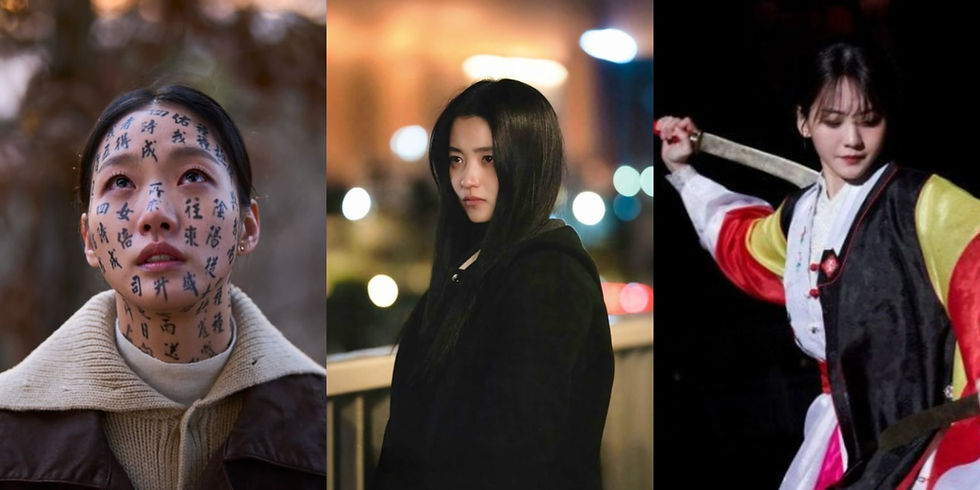Netflix's Next Obsession? How Korean Mysticism (Occult) is Casting a Global Spell
- lewishooper1

- Jul 29, 2025
- 3 min read
From ancient rituals to Netflix binges, how shamanism is reshaping the Hallyu Wave. Let's dive in deeper and see why it has been captivating global audiences!

What does the term "K-Occult" mean?
Okay, so first up what is "K-Occult"? Well this is a relatively new and informal term that refers to Korean-produced media (films, dramas, webtoons, etc.) that heavily feature traditional Korean folklore, shamanism, mysticism, and supernatural elements. This is very much unlike typical Western horror, because K-Occult offers a fresh, culturally rich perspective through shamanistic rituals, unique spirits, and ancient beliefs. This distinct genre is rapidly gaining worldwide traction, drawing audiences into Korea's unique mystical world.

So, what makes K-occult so captivating? Unlike the Western occult genre, which often focuses on vampires and werewolves, Korean occult draws deeply from its cultural and historical roots, incorporating shamanism, Buddhism, and folk beliefs. This unique fusion offers a deeper understanding of Korean culture.
Exhuma and the Power of Korean Land

Another jaw dropping K-Occult film, Exhuma, which was released last year in 2024. This wasn't a horror movie but more of a chilling dive into the Pungsujiri which is an ancient belief which holds a lot of power.
The Pungsujiri dictated that the energy of the earth directly impacts those who live on it or, crucially, those whose ancestors are buried within it. Exhuma masterfully builds on this eerie concept, exploring the supernatural dread that can be unleashed when families face misfortune, or even haunting by vengeful ghosts, all because their ancestors rest in inauspicious, cursed ground. It's a spine-tingling premise rooted deeply in Korea's mystical heritage and it is for sure one not to be missed if you haven't seen it already.
You WON'T Believe What's Taking Over K-Content – And Why Western Audiences Are OBSESSED!
Forget everything you thought you knew about Korean dramas! Shamanism isn't just for horror flicks anymore; it's the hottest new trend in K-content, and it's captivating global audiences, especially in the West where in recent years K-dramas have taken off, and Korean culture is starting to cement itself in many European and American households.
Thanks to global streaming giants like Netflix, these shaman-themed dramas are breaking cultural barriers, offering viewers a fresh and powerful way to explore universal themes.
At Dojeon Media, we're bringing moving stories about family bonds, the journey of healing, and the rich tapestry of tradition.
The K-Occult Unveiled: A Glimpse into Korean Folk Beliefs
Traditional Korean culture and its beliefs can be seen clearly than ever before, and they are showcased with a strong connection to nature, ancestral spirits, and direct communication with deities through shamans.
Shamans aren't just characters on screen; young, tech-savvy shamans are building massive followings on social media, blurring the lines between ancient tradition and modern influence. Even A-list Korean stars are jumping on board these mystical projects, proving this isn't just a fleeting fad.
Making it clearer for audiences has also never been easier, and this can be seen through films like The Wailing (2016), which offers a chilling yet insightful window into typical Korean folk beliefs. These traditions deeply embrace and show a strong connection to nature, ancestral spirits, and direct communication with deities through shamans, which in 2025 can still ring true for many people who visit Korea, as these rich values are shown throughout Korea and Korean families.
In the film, a shaman embodies this spiritual link, channeling power from the gods to cure illnesses, bless fortunes, or bravely exorcise malevolent forces. This is vividly portrayed in a powerful scene where the shaman performs a dramatic ritual, known as a "gut," specifically to purge evil spirits and protect the beleaguered village. Sounds dramatic? Well, these are all things that Koreans once believed and some still do today.
2025 will see plenty of K-dramas and films using this ancient tradition to tell fresh, emotional stories. Viewers in Korea and around the world are loving the mix of mystery, culture, and heart that comes with it. From ancient legends to modern screen hits, the captivating world of K-Occult invites you to discover the deeper, mystical soul of Korea. Do you have any favorite K-Occult tales? If so, comment below and let the Dojeon team know!








Comments